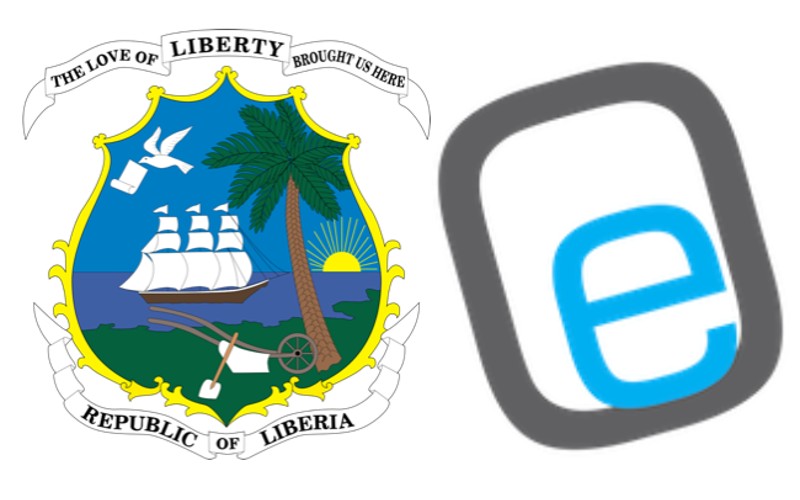
Created by - Elite Offshore
Elite Offshore Pvt Ltd: Empowering Offshore Professionals with Liberia Govt Approved Training
Elite Offshore Pvt Ltd, based in CBD Belapur in Navi Mumbai, provides essential training for offshore professionals. The institution proudly offers Liberia Government (LISCR) approved courses, including the coveted Offshore Installation Manager (OIM), Barge Master (BM), Ballast Control Operator (BCO), and Maintenance Supervisor (MS) programs. These courses are meticulously designed to equip individuals with the necessary skills and certifications to excel in the offshore industry.A Pathway to Offshore ExcellenceElite Offshore's training programs are not just about learning; they are about preparing individuals for real-world challenges in the maritime industry. The courses are conducted in compliance with the International Maritime Organization (IMO) resolution A.1079(28) adopted on 4th December 2013, ensuring adherence to global standards of excellence.Program Highlights:Offshore Installation Manager (OIM): This program is tailored for individuals aspiring to lead offshore installations with confidence and expertise. Participants learn to manage a Mobile Offshore Unit (MOU) under various operational and emergency scenarios, such as transit, ballasting, jacking, and loss of control situations.Barge Supervisor / Barge Master (BM): Designed for those aiming to master the art of managing and operating barges in offshore environments. The course covers essential topics like barge stability, navigation, cargo handling, and personnel management.Ballast Control Operator (BCO): Focusing on the critical role of controlling the stability and ballasting of offshore structures. Participants are trained to handle ballast system operations, stability calculations, and emergency procedures.Maintenance Supervisor (MS): Equipping individuals with the skills to oversee maintenance activities on offshore installations. The curriculum includes asset integrity management, preventive maintenance, and equipment troubleshooting.Training ModalitiesElite Offshore understands the diverse needs of offshore professionals, offering both offline and online training modes. Participants can choose to attend sessions at the institution's state-of-the-art campus in CBD Belapur or opt for the convenience of online learning, ensuring accessibility and flexibility.Advancing Careers, Ensuring SafetyThe primary objective of Elite Offshore's Liberia Govt approved training is to empower prospective and incumbent MOU OIMs to safely manage offshore units under various operating conditions. The courses simulate real-world scenarios, preparing participants to navigate challenges with confidence and efficiency. It is noteworthy that the BCO course (MOU Stability) and at least IWCF Well Control Level 2 certification are prerequisites for the OIM position, ensuring comprehensive readiness for the role.How to EnrollInterested individuals can visit the official website at https://eliteoffshore.in to explore detailed course descriptions, schedules, and registration procedures. For those seeking personalized guidance or further information, the Elite Offshore training team is readily available via email at training@eliteoffshore.in or by calling +91-22-4970 4933 or +91-80 9747 2277.ConclusionThrough Liberia Govt approved training programs, participants not only acquire essential skills and certifications but also gain the confidence to tackle the complexities of offshore operations. Certificate of Competency issued by Liberian Govt may be obtained by taking on-line exam and applying to Liberia Govt post passing the exam and fulfilling necessary certification requirements. For those interested, Elite Offshore Pvt Ltd welcomes you to explore its world-class training programs. Visit https://eliteoffshore.in today and chart your course towards a prosperous offshore career.
More detailsPublished - Tue, 16 Apr 2024
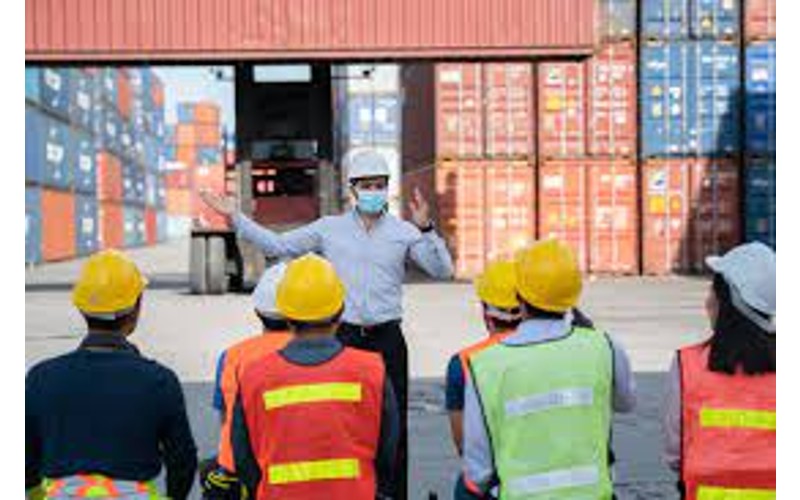
Created by - Elite Offshore
Liberia approved Barge Supervisor (BS) / Barge Master Course by Elite Offshore
Elite Offshore, a renowned name in maritime training and certification, conducts the Liberia Approved Barge Supervisor/Barge Master Course. This offering aims to equip aspiring professionals with the skills and knowledge needed to excel in the dynamic world of offshore operations. Designed to meet the rigorous standards set by the Liberian Registry, one of the world's largest and most respected maritime flags, this course covers a comprehensive range of topics essential for those seeking roles as Barge Supervisors or Barge Masters. From safety protocols to operational procedures, participants will delve into every aspect of managing and overseeing barge activities with precision and expertise. One of the standout features of Elite Offshore's program is its practical approach. Understanding the complexities of offshore environments, the course emphasizes hands-on learning and real-world experience sharing. This ensures that participants not only grasp theoretical concepts but also develop the practical skills necessary to thrive in demanding offshore settings. Moreover, Elite Offshore prides itself on its team of experienced instructors who bring a wealth of industry knowledge to the classroom. With their guidance, students gain insights from seasoned professionals, learning from their firsthand experiences and benefiting from their invaluable advice. The significance of obtaining Liberia's approval for this course cannot be overstated. Liberia's reputation as a leading maritime authority underscores the course's credibility and relevance on a global scale. Graduates can be confident that their certification carries weight and is recognized by industry stakeholders worldwide, opening doors to a multitude of career opportunities. In addition to meeting international standards, Elite Offshore is committed to providing flexible training solutions, which it does with other Liberia approved courses e.g. Offshore Installation Manager (OIM), Ballast Control Operator (BCO) and Maintenance Supervisor (MS). Whether through in-person sessions or online modules, the organization ensures accessibility for students from diverse backgrounds and geographic locations. This commitment to inclusivity reflects Elite Offshore's dedication to empowering individuals to pursue their maritime ambitions without constraints. As the offshore industry continues to evolve, the demand for skilled professionals capable of navigating its challenges remains constant. With the Liberia Approved Barge Supervisor/Barge Master Course, Elite Offshore not only meets this demand but also sets a new standard for excellence in maritime training. By equipping individuals with the expertise and credentials needed to succeed, Elite Offshore is shaping the future of offshore operations, one student at a time. Elite Offshore's introduction of the Liberia Approved Barge Supervisor/Barge Master Course marks a significant milestone in maritime education. With its comprehensive curriculum, practical approach, and global recognition, the course stands as a testament to Elite Offshore's commitment to excellence and innovation in the field of offshore training. For those aspiring to excel in the dynamic world of offshore operations, this course is undoubtedly a pathway to success.
More detailsPublished - Wed, 05 Jun 2024
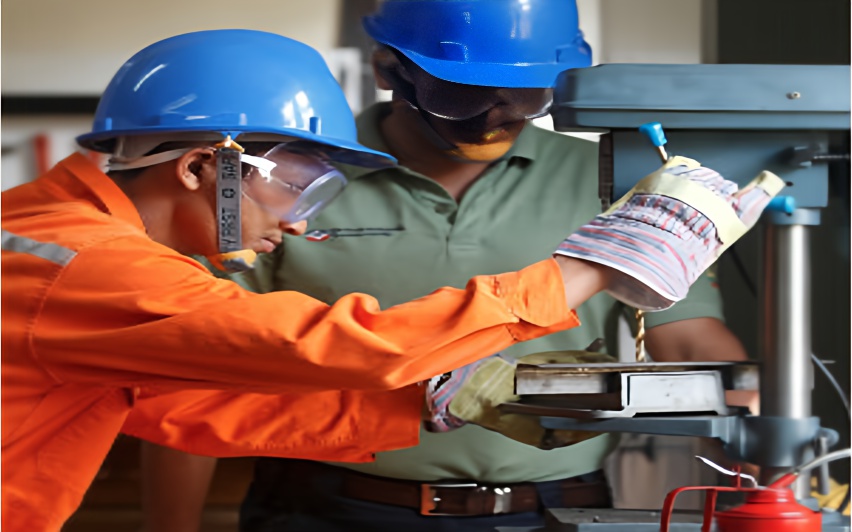
Created by - Elite Offshore
Enhancing Expertise: The Liberia Approved Maintenance Supervisor/Chief Mechanic Course at Elite Offshore
Elite Offshore conducts comprehensive training program on the Liberia flag (LISCR) approved Maintenance Supervisor / Chief Mechanic Course. Maintenance Supervisor course is as per IMO Resolution A.1079(28) adopted on 4th Dec 2013. This course is applicable for non propulsion vessel such as Construction, Pipe-lay and Accommodation barges; Semisub and Jackup drilling units etc which use anchor to stay in position. Tailored to meet the evolving demands of the offshore industry, this course equips participants with the knowledge and skills necessary to excel in their roles as maintenance supervisors and chief mechanics. Elite Offshore's (https://eliteoffshore.in) commitment to excellence extends beyond its operational endeavors; it extends to nurturing talent and fostering professional growth within the industry. Designed by industry experts and approved by Liberia, a leading maritime authority, this course promises to elevate participants' capabilities to new heights. Course Contents: 1. Fundamentals of Maintenance Supervision: - Understanding the role and responsibilities of a maintenance supervisor. - Effective communication and leadership skills. - Resource allocation and scheduling techniques. 2. Mechanical Systems Overview: - In-depth exploration of mechanical systems commonly found in offshore environments. - Principles of operation, maintenance, and troubleshooting for engines, pumps, compressors, and more. - Safety considerations and best practices when working with mechanical equipment. 3. Hydraulic and Pneumatic Systems: - Comprehensive study of hydraulic and pneumatic systems and their components. - Hands-on training in system design, maintenance, and repair. - Practical exercises to reinforce learning and develop proficiency. 4. Electrical Systems and Instrumentation: - Basics of electrical systems and instrumentation in offshore facilities. - Diagnosis and troubleshooting of electrical faults. - Safety protocols for working with electrical equipment in hazardous environments. 5. Preventive Maintenance Strategies: - Importance of preventive maintenance in ensuring equipment reliability and longevity. - Development and implementation of preventive maintenance plans. - Use of advanced tools and technologies for condition monitoring and predictive maintenance. 6. Emergency Response and Safety Procedures: - Preparation for emergency situations, including fire, gas leaks, and equipment failures. - Role-specific responsibilities during emergencies. - Simulation exercises and drills to simulate real-world scenarios and enhance response capabilities. 7. Regulatory Compliance and Documentation: - Familiarization with relevant regulations and standards governing offshore maintenance operations. - Documentation requirements for maintenance activities, inspections, and audits. - Importance of compliance in ensuring safety, environmental protection, and regulatory adherence. 8. Soft Skills Development: - Effective communication and interpersonal skills. - Conflict resolution and problem-solving techniques. - Time management and organizational skills. Advantages of the Course: 1. Industry-Relevant Curriculum: The course content is carefully crafted to address the specific challenges and requirements of maintenance supervision and chief mechanic roles in the offshore industry, crafted as per IMO Resolution A.1079(28) adopted on 4th Dec 2013. 2. Practical Learning Experience: Participants benefit from hands-on training sessions and simulation exercises, allowing them to apply theoretical knowledge in real-world scenarios. 3. Professional Certification: Upon successful completion of the course, participants receive a Liberia-approved certification, validating their expertise and enhancing their career prospects. 4. Career Advancement Opportunities: The acquired skills and certification open doors to career advancement opportunities, including promotions to higher positions and greater responsibilities. 5. Enhanced Safety Awareness: Comprehensive training in emergency response and safety procedures equips participants with the skills and confidence to respond effectively to challenging situations, ensuring the safety of themselves and their colleagues. For any further information, please contact training@eliteoffshore.in or call +91-22-4970 4933 or +91-80 9747 2277. You may visit our website https://eliteoffshore.in (for all courses) or https://ecademy.eliteoffshore.in (for e-learning courses). Visit our training centre at below address: Elite Offshore Pvt. Ltd. G- 5, Platform Level, Tower-3, Belapur Railway Station Complex, Sector-11, C.B.D. Belapur, Navi Mumbai-400614. Contact No. +91-80-9747-2277, +91-22-4970-4933, +91-22-4600-3839 Email: info@eliteoffshore.in or training@eliteoffshore.in
More detailsPublished - Wed, 12 Jun 2024
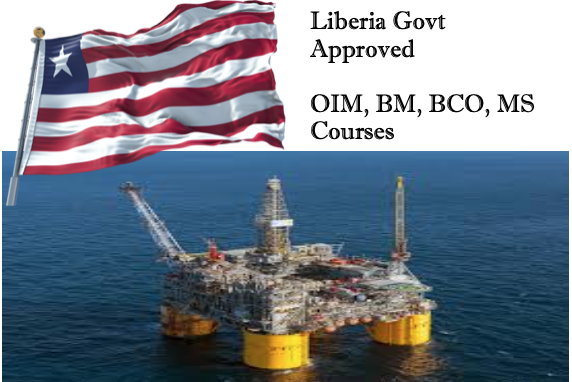
Created by - Elite Offshore
Liberia Flag Approved Offshore Installation Manager (OIM) Training by Elite Offshore
The offshore oil and gas industry is a high-stakes field requiring rigorous training and certification to ensure safety, efficiency, and regulatory compliance. One of the most crucial roles within this industry is that of the Offshore Installation Manager (OIM). The OIM is responsible for the overall management of offshore installations, encompassing everything from safety and operations to crew welfare and emergency response. Elite Offshore, a leading training provider, offers a comprehensive Liberia flag-approved OIM training program designed to meet the highest standards set by the International Maritime Organization (IMO) and other regulatory bodies.Importance of OIM TrainingThe role of an OIM is multifaceted and demanding. Effective training is critical to ensure that OIMs possess the necessary skills and knowledge to manage offshore installations safely and efficiently. The training program by Elite Offshore not only meets regulatory requirements but also provides participants with hands-on experience and real-world scenarios to enhance their learning.Duties and Responsibilities of an OIMThe Offshore Installation Manager holds a pivotal role in the offshore industry. Their duties and responsibilities are diverse, encompassing several critical areas:Safety Management1. Ensuring Safety Compliance: The OIM is responsible for ensuring that all operations comply with safety regulations and standards. This includes regular safety drills, inspections, and adherence to safety protocols.2. Risk Assessment and Mitigation: Conducting risk assessments and implementing measures to mitigate identified risks. The OIM must be proactive in identifying potential hazards and taking steps to prevent accidents.3. Emergency Response Coordination: In the event of an emergency, the OIM coordinates the response, ensuring that all personnel are aware of their roles and responsibilities. This includes managing evacuation procedures and liaising with rescue services.Operational Management1. Overseeing Operations: The OIM oversees all operations on the installation, ensuring that they are carried out efficiently and safely. This includes drilling, production, and maintenance activities.2. Resource Management: Managing resources, including personnel, equipment, and supplies, to ensure that operations run smoothly. The OIM must balance the needs of different departments and prioritize tasks effectively.3. Maintenance Oversight: Ensuring that all equipment and systems are properly maintained and operational. This includes scheduling regular maintenance and addressing any issues promptly to prevent downtime.Personnel Management1. Supervising Crew: The OIM supervises the crew, ensuring that they are well-trained, motivated, and working safely. This includes conducting performance reviews, providing feedback, and addressing any issues that arise.2. Training and Development: Overseeing the training and development of personnel, ensuring that they have the skills and knowledge required to perform their duties effectively.3. Welfare and Morale: Ensuring the welfare and morale of the crew, addressing any concerns, and fostering a positive working environment. This includes managing accommodations, catering, and recreational facilities.Regulatory Compliance1. Adhering to Regulations: Ensuring that the installation complies with all relevant regulations and standards. This includes environmental regulations, health and safety standards, and industry best practices.2. Record Keeping: Maintaining accurate records of all operations, incidents, and maintenance activities. These records are essential for regulatory compliance and for identifying areas for improvement.3. Audit and Inspection: Preparing for and managing audits and inspections by regulatory bodies. The OIM must ensure that all documentation is up-to-date and that the installation is ready for inspection at all times.Communication and Reporting1. Liaising with Stakeholders: Communicating with stakeholders, including the installation owner, regulatory bodies, and other relevant parties. The OIM must provide regular updates on operations, safety, and any issues that arise.2. Incident Reporting: Reporting incidents, near misses, and any other significant events to the appropriate authorities. This includes conducting investigations and implementing corrective actions to prevent recurrence.3. Daily Reporting: Providing daily reports on operations, highlighting any issues or concerns, and outlining plans for the coming days.Liberia Flag-Approved OIM Training by Elite OffshoreThe Liberia flag-approved OIM training program offered by Elite Offshore is designed to meet the highest standards of the industry. The program covers all aspects of the OIM role, ensuring that participants are well-prepared to take on this critical position.Training Program ContentThe content of the training program is based on the guidelines set out in IMO Resolution A.1079(28), dated December 4, 2013. The resolution outlines the competencies required for OIMs, focusing on safety, operational efficiency, and regulatory compliance.Certification and AccreditationUpon successful completion of the Liberia flag-approved OIM training program, participants receive a certification that is recognized by the Liberia Maritime Authority. This certification demonstrates that they have met the highest standards of training and are qualified to take on the role of an OIM.The Offshore Installation Manager (OIM) plays a crucial role in the offshore oil and gas industry, overseeing operations, ensuring safety, and managing personnel. Effective training is essential to prepare OIMs for the demands of their role, ensuring that they have the skills and knowledge required to manage offshore installations safely and efficiently.
More detailsPublished - Mon, 17 Jun 2024
Search
Popular categories
OSHA & Industrial Safety Courses
12Liberia Approved Rig Courses
4Marine and Offshore
3IADC Approved - E learning
2Offshore Oil and Gas Rig Courses
2Port & Marine Courses
1Latest blogs
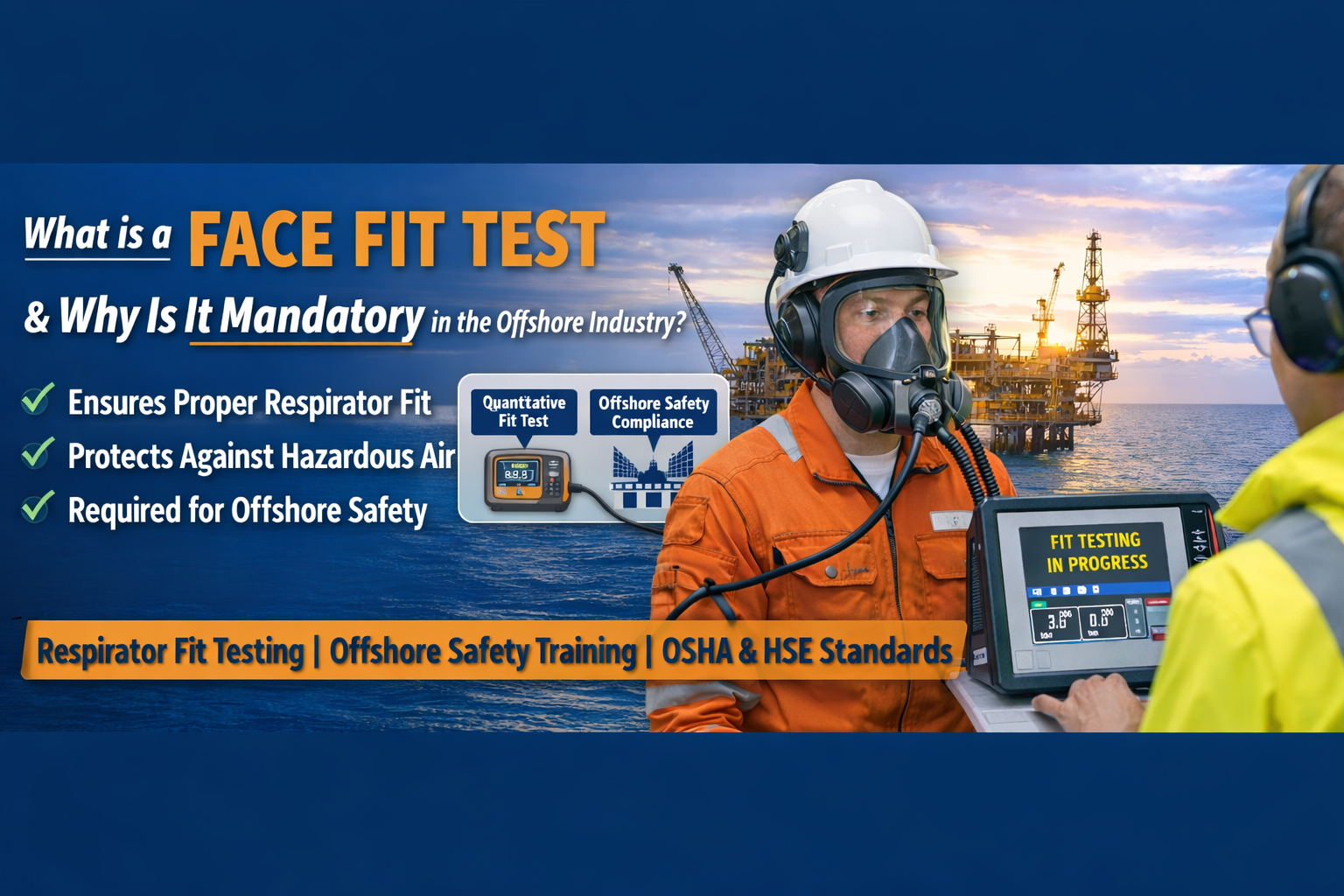
What is a Face Fit Test & Why Is It Mandatory in Offshore Industry?
Thu, 12 Feb 2026

BOSIET & CA-EBS Safety Training Navi Mumbai | Elite Offshore Pvt Ltd
Tue, 10 Feb 2026
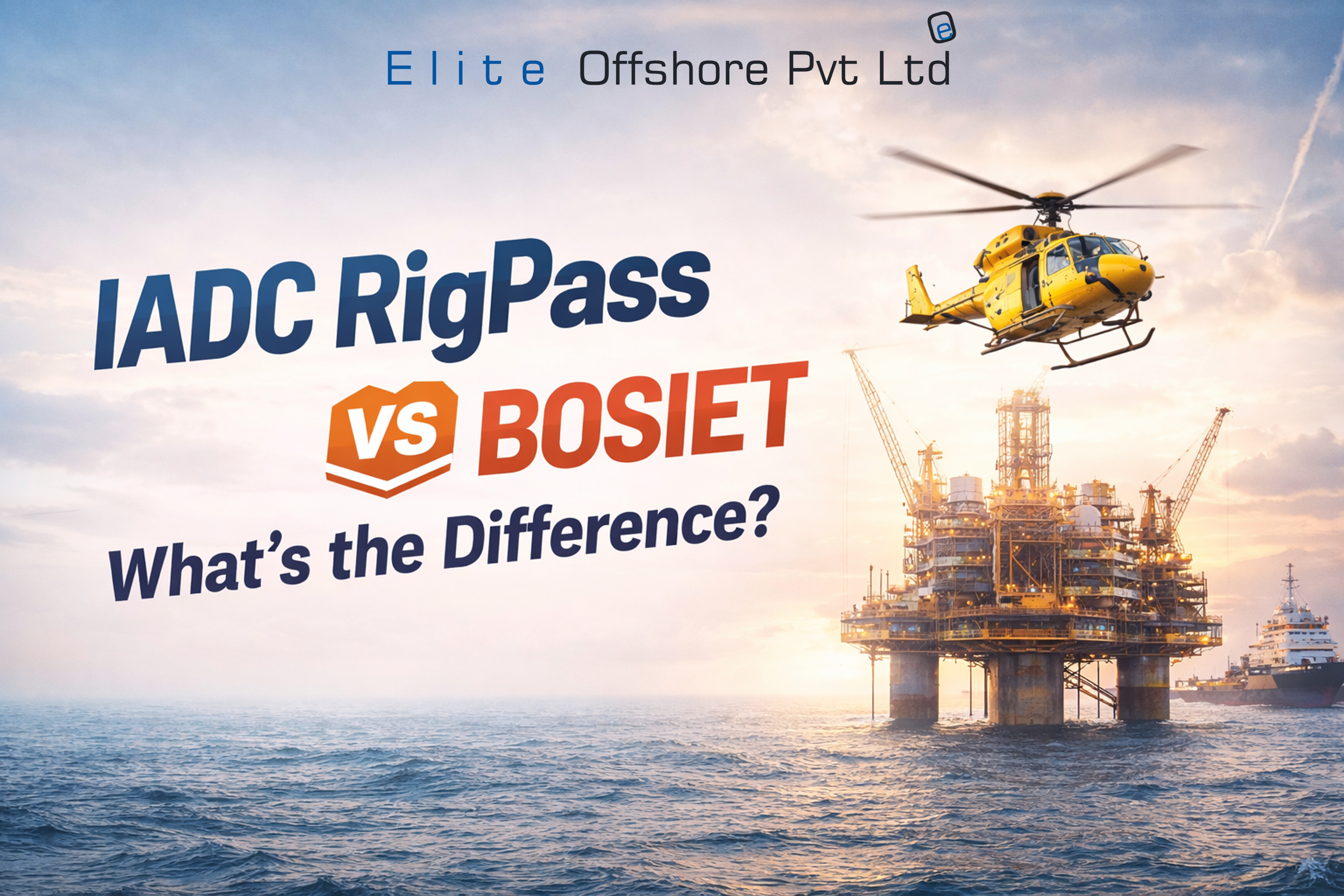
IADC RigPass vs BOSIET – what’s the difference?
Wed, 04 Feb 2026
Write a public review